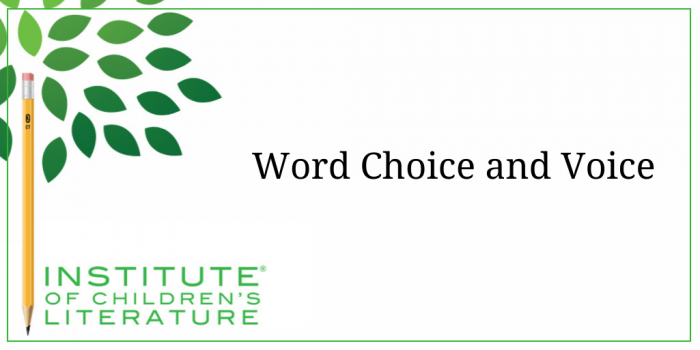1000 N. West Street #1200, Wilmington, DE 19801
© 2024 Direct Learning Systems, Inc. All rights reserved.
Beginning Tuesday, July 22, 2025 at 10 PM CT through Wednesday, July 23, 2025 at 4 AM CT, we will be performing scheduled maintenance to update our website.

Anyone who has read my past essays much will know that I’m often anti-rules and pro-purpose. In other words, I believe that nearly any writing choice can be made as long as it is done with thought and purpose, and can thus be defended. Writing rules like “never use being verbs” or “no passive voice” or “cut all adverbs” simply serve to limit the tools in the careful writer’s toolbox. And that means, they limit your options for voice. And I’m all for being a limitless writer. Still, any choice you make needs to be done with awareness and with purpose. Let’s look at one of the number one contributors of voice: word choice.
First of all, if you’re a huge fan of the thesaurus, beware. A thesaurus is a bit like a chef who jumbles all his pizza toppings in a single bowl and chooses them at random. You can easily make a really icky pizza if you throw on anchovies as if they were black olives. They may both be toppings, but they aren’t interchangeable. The words you find listed as possible synonyms in a thesaurus are a bit like that. Every word carries its own unique flavor. There are shades of meaning and many words carry a good bit of baggage from other ways they are used. And that baggage needs to be recognized and evaluated by the writer.
I’ve seen a good many helpful essays about improving your verbs that list a whole bunch of words you can use to replace common verbs like went or walked, the implication being that you have lots of choices. In fact, you don’t, because every choice you make changes the tone and sometimes the meaning of what you’ve written. Let’s look at a passage that uses a very common word: “stood.”
Kelly peered out between the advertising that covered most of the glass. In the dark parking lot, a boy stood.

Still, in this instance, it’s actually the very common word, stood, that we’re going to consider. A boy stood. There’s starkness to the last of detail there. It’s a boy, not a man, but that can encompass a lot of age ground. And stood only tells us that he’s not sitting or moving around. You might choose to use the word stood to show that, so far, Kelly doesn’t have much information or judgement about what this boy is doing. It’s the starkest and most judgement free of verbs, and maybe it’s exactly what you want. But what if you feel pushed by the “choose unique verbs” school of thought and pick a different verb? Let’s try it.
Kelly peered out between the advertising that covered most of the glass. In the dark parking lot, a boy waited.
Now the whole complexion of the experience has changed. Either Kelly knows this boy and why he’s there, or she’s making a big leap. What would make her think he’s waiting? Is it because she knows he’s waiting on her? Or is she picking up small clues in the way he’s glancing down at his phone and then out at the empty street? Both would be good reasons for her assumption that he’s waiting. A waiting boy is definitely not the same thing as a standing boy. One has a built-in assumption and the other is a stark description of action. But what if we don’t want to imply Kelly may have some relationship with this boy, some special knowledge, but we still want to learn something. What’s another choice the author might have made? And what comes from it? Consider this:
Kelly peered out between the advertising that covered most of the glass. In the dark parking lot, a boy loitered.
Again, this is a choice with judgement. “Waiting” is fairly neutral, morally. A boy who is waiting may be waiting on something nefarious (like for Kelly to come out so he can harm her) or he may be waiting on something innocuous (like for his uncle to pick him up after work), but “loitering” has a built-in moral judgement that comes from something more than the textbook definition. Technically, to loiter is simply “to linger aimlessly” (Merriam-Webster) or “to delay an activity with idle stops and pauses” or “to remain in an area for no obvious reason.” But we’ve seen the signs demanding no loitering enough that the word “loiter” has become infused with the feeling of bad intent. Bad guys loiter just before they get into mischief. So though “loiter” is actually a fine, almost neutral choice on the surface ( since it shows Kelly doesn’t see any obvious reason for the boy standing there) it carries more than the dictionary sense of lack of purpose. It suggests (though the connotative baggage that it carries) that he’s hanging around hoping for the chance to make trouble. It might be exactly the word you want to choose. It certainly ups the voice in the brief sentence, but it’s only the right choice if the baggage it carries is something you want to bring to the passage.
Many words available to the writer carry baggage that we need to consider. It isn’t enough to know the precise, literal, textbook definition (also known as the denotation). We need to know how the reader is going to react to the word, and for that we need to think about its baggage.

Chickens, for example, are small domestic fowl. They can be surprisingly fierce, and many farm children have horror stories about rooster attacks. But they are also small creatures and a flock of them is easily scattered. It is this second attribute of chickens that cause chickens to be associated with humans who are easily frightened and prone to running away from trouble. People were called chicken before this second definition ever became accepted by dictionaries. These kinds of transformations in words continue to happen all the time. It’s the nature of the imaginative connections humans make in their use of language. And the wise writer looks at both connotation and denotation in choosing the best word for the moment.
Sometimes the baggage you’ll choose when you pick a word will be particular to the character. For example, Scrooge was stingy, but he would have considered himself thrifty. Those around him would have seen his attachment to work as obsessive, but he would consider himself as industrious. So point of view can affect how you choose words.
Unique words do build voice. They get attention. They make readers think about a story moment in different ways. They carry associations far beyond what they seem on the surface. This is one reason why thesauruses can be dangerous if not used wisely. Use them to remind yourself of the wide array of vocabulary available to you, but choose only those words you can control because you know them well. Remember, when it comes to writing, you’re the master here.
Consider the following passage:
He cocked his head, sizing up the young model’s pose. Satisfied, he aimed the camera and began shooting.

But if the writer is simply describing a perfectly normal fashion photographer, you’ve got a problem. And it’s a problem that grows out of how our brains work. The writer’s brain is actually aware of all the denotative stuff that comes with “cocked” and likes chaining things like that together, even when you’re not aware of it. So aimed and began shooting is your brain’s way of creating a pattern. Human brains love patterns. So be aware of that possibility and watch for it, because we do want voice, but we don’t want to turn our characters into accidental serial killers. The writing you save by such care, could be your own.
With over 100 books in publication, Jan Fields writes both chapter books for children and mystery novels for adults. She’s also known for a variety of experiences teaching writing, from one session SCBWI events to lengthier Highlights Foundation workshops to these blog posts for the Institute of Children’s Literature. As a former ICL instructor, Jan enjoys equipping writers for success in whatever way she can.
1000 N. West Street #1200, Wilmington, DE 19801
© 2024 Direct Learning Systems, Inc. All rights reserved.
1000 N. West Street #1200, Wilmington, DE 19801
© 2024 Direct Learning Systems, Inc. All rights reserved.
1000 N. West Street #1200, Wilmington, DE 19801
© 2024 Direct Learning Systems, Inc. All rights reserved.
1000 N. West Street #1200, Wilmington, DE 19801
© 2025 Direct Learning Systems, Inc. All rights reserved.
1000 N. West Street #1200, Wilmington, DE 19801
©2025 Direct Learning Systems, Inc. All rights reserved. Privacy Policy.
3 Comments